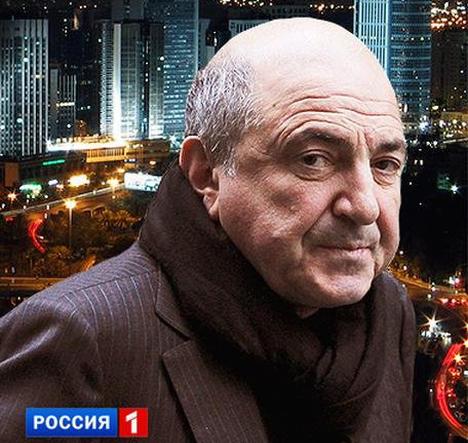Published on behalf of the Reporters for Press Freedom (with the help of EZ Productions)
 Courtesy of VGTRK
Courtesy of VGTRK
In the minds of many Russians, the new capitalism that began after 1991 with its oligarchs, pyramid schemes, voucher privatizations, and the largest transfer of property in world history, is epitomized by one man: Boris Berezovsky, dubbed “Godfather of the Kremlin” by the late American journalist Paul Klebnikov. Once simultaneously heading the country’s largest corporations, serving as Deputy Chairman of Russia’s Security Council and acting as personal confidante of President Boris Yeltsin, Mr. Berezovsky has lived since 2003 in London exile, wanted in his homeland on charges of fraud, bribery, embezzlement, and money laundering. A new documentary by the Russia 1 television network tells his story.
Prominent TV journalist Andrei Kondrashov’s two-hour documentary begins with Mr. Berezovsky’s first brush with the law (for alleged petty fraud back in 1981), and moves on to his rise to wealth and fame after the USSR dissolved, including the AVVA Ponzi scheme, which robbed thousands of investors of funds supposedly invested into a new “people’s car.” It alleges that organized-crime family boss, Sergey Timofevey, who had lost $45 million in the scheme, tried to kill Mr. Berezovsky with a car bomb. Three months later, Timofey himself was killed by a car bomb.
Russian Deputy Prosecutor General Alexander Zvyagintsev has announced that Moscow will once again seek the extradition of Mr. Berezovsky, based on the new allegations presented in the film. If even only some of the allegations of criminal activity in the film are proven, the question of whether Mr. Berezovovsky truly deserves to keep his political refugee status in the United Kingdom may well be revisited.
The film also alleges that Mr. Berezovsky and his late partner Badri Patarkatsishvili bilked Russia’s biggest car-maker of untold millions through a “dealership” company, Logovaz, that allegedly forged invoices and sales documents to show vast numbers of cars had suddenly been exported at dumping prices, when in fact they had been sold in Russia for prices that were 100% higher. The difference was allegedly siphoned off through a maze of shell companies in offshore tax havens. According to Mr. Klebnikov, “law enforcement officials who tried to break the cycle of criminality met grisly ends. When the head of the Samara Region prosecutor’s office began investigating what was happening to the factory, he was assassinated”.
In 2009, after a lengthy inquiry and a trial in absentia, at which Mr. Berezovsky was represented by a court-appointed lawyer, a Russian court sentenced him to 13 years in jail for grand larceny and embezzlement of over $40 mln from Avtovaz.
The film also claims Mr. Berezovsky looted the country’s once profitable national airline Aeroflot when he ran it between 1995-1998. Under Mr. Berezovsky, all the airline’s hard currency revenues were allegedly funneled into a tiny Swiss company called Andava, owned by him personally. According to Mr. Klebnikov, “Andava was effectively a loan-sharking operation, setting up offshore subsidiaries designed to milk Aeroflot’s cash flow.” (Annual interest rates on “loans” between the airline and offshore shell companies were listed in the airline’s annual reports as 65% plus “penalties.” The company hemorrhaged cash. Hundreds of millions in revenues disappeared; by 1998, the company was so short of cash, that Canadian Mounties seized an Aeroflot plane in Montreal for non-payment of a tour operator). In the year 2007, a court in Moscow sentenced Mr. Berezovsky to 6 years in jail for grand larceny and fraud against Aeroflot.
The film accuses Mr. Berezovsky of continuing criminal activity even after his exile. In the documentary, the former director of Ukraine’s Security Service, Igor Smeshko, alleges that in 2004, Russian presidential candidate Ivan Rybkin was kidnapped on Mr. Berezovsky’s orders (the politician was rescued by police in Kiev several days later). It also claims that Berezovsky plotted to explode a car bomb outside the offices of then-Ukrainian presidential candidate Viktor Yushchenko, and that Mr. Berezovsky was behind the murder of Russian parliamentarian Sergey Yushenkov (the man convicted of the crime claims Mr. Berezovsky promised him $3 million for his silence). It also claims that through an Iranian proxy, Berezovsky gained control of one of Brazil’s most famous soccer teams, São Paulo’s Corinthians, with a fan base of 30 million supporters. A São Paulo prosecutor told the film crew: “Boris had a huge amount of money which he had taken from the Russian people. Now he wanted to bring this money back to Europe in some official way. That way was money laundering, and the method was through football club investments.”
After reports of alleged fake invoices and of large suitcases arriving with millions of dollars in cash from offshore companies controlled by Berezovsky and Patarkatsishvili, on July 13, 2007, Federal Judge Fausto De Sanctis signed orders for the arrest of Berezovsky for money laundering and conspiracy. The judge was removed without explanation, and case mysteriously dropped; in the film, a Brazilian investigative reporter alleges that Berezovsky exerted undue influence to get out of trouble.
Kondrashov has told journalists that he got the idea for the film following a high-profile legal battle between Berezovsky and Abramovich in the English High Court, which Berezovsky lost. (In her ruling, Justice Elizabeth Gloster said of Berezovsky: “I found [him] an unimpressive, and inherently unreliable, witness, who regarded truth as a transitory, flexible concept, which could be molded to suit his current purposes. At times the evidence which he gave was deliberately dishonest; sometimes he was clearly making his evidence up as he went along.”)
Mr. Kondrashov, the film’s presenter, says the witnesses who appear in his film were encouraged to speak out by Mr. Berezovsky’s loss in the trial.
All rights reserved by Rossiyskaya Gazeta.
Subscribe
to our newsletter!
Get the week's best stories straight to your inbox